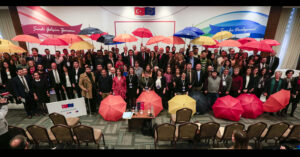
Technical Assistance for Implementation of Civil Society Dialogue and Civil Society Support Programmes (TR2015/DG/01/A5-01/001)
The overall aim of the project is to increase bilateral exchanges and cooperation between CSOs in Turkey and the EU at local, regional and national levels, to promote awareness raising initiatives on importance and benefits of membership of Turkey to the EU within Turkey and EU and on

Consultancy Services for Feasibility Study and Needs Analysis Related with an ‘Environment and Efficiency Centre’ within TOBB structures
An initiative that served to strengthen energy efficiency practices and renewable energy strategies of the private sector was to be of great importance to support private sector institutions in this regard. The project aimed to support Energy Efficiency practices and renewable Energy strategies of the private sector in

Technical Assistance for Result Oriented Monitoring in Turkey-Phase III
Within the scope of this project, we are aiming to ensure efficient and effective of IPA II assistance with a view to better achievement of the objectives set out in the Indicative Strategy Paper of Turkey (2014-2020) and assist NIPAC to fulfil his extended monitoring responsibility.

Ministry of Development Training Programme
Organisations need technical assistance with funds and areas like good management practices; monitoring reports; training programmes on monitoring and evaluation; objectives and indicators, etc. Therefore, the project aimed to provide technical assistance to the Ministry in the field of fund management to the Standing Committee for Economic and

Technical Assistance to Implementation of Civil Society Support Programme
The overall objective of the project is to support the development of civil society through more active democratic participation in policy and decision making processes and by promoting a culture of fundamental rights and dialogue.

Strengthening Vocational Qualifications Authority (VQA) and National Qualifications System (NQS) in Turkey
It can be claimed that the labour markets are required to ensure the provision of formal and non-formal education and training, to support life-long learning, strengthening the relationship between education and employment, and facilitating harmonization with the European Qualifications Framework (EQF). Within this scope, the project aimed to

